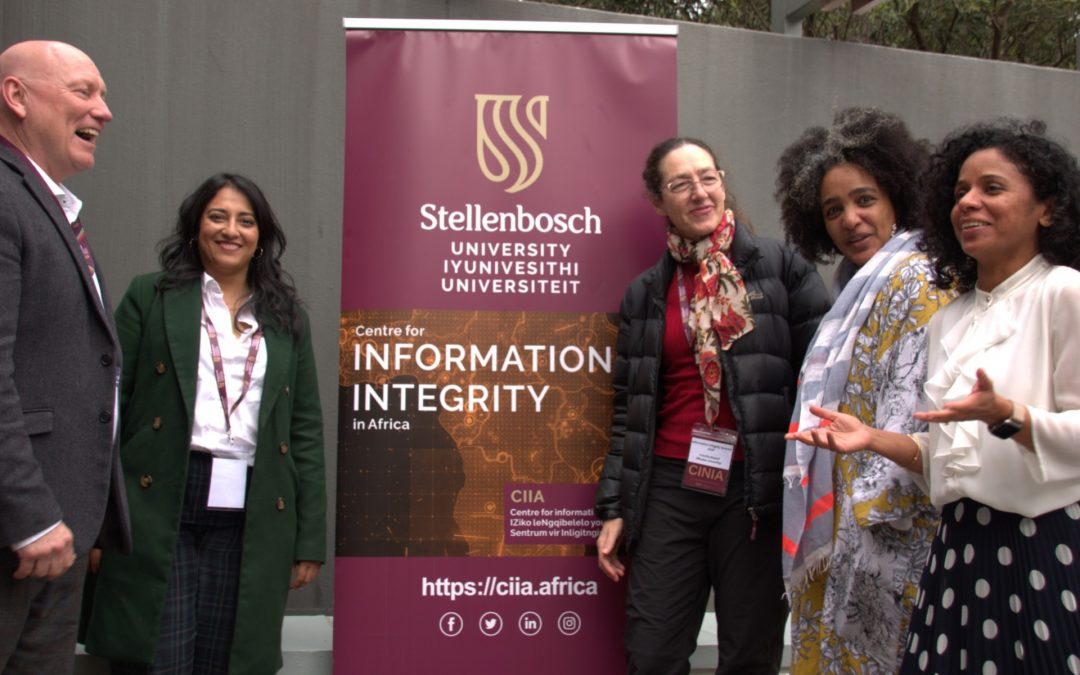A first-of-its-kind Summit on Information Integrity featuring leading researchers, policy activists, industry roleplayers and media practitioners was hosted this week by the Sentrum vir Inligtingsintegriteit in Afrika (CINIA) aangebied om die dwingende vraagstukke waarvoor die integriteit van die inligtingsekostelsel tans te staan kom, aan te pak.
Die beraad was die eerste groot geleentheid wat deur die onlangs gevestigde Sentrum, in die Universiteit Stellenbosch se Departement Joernalistiek, gereël is. Die CINIA is ʼn medewerkende navorsingsentrum aan die voorpunt van die stryd teen die proliferasie van waninligting en skadelike inhoud op digitale platforms.
The summit was hosted at the Stellenbosch Institute for Advanced Studies (STIAS), from 23 to 24 July. Featuring over 40 participants, it brought together fact-checkers, researchers, journalists, policy advocates and other key industry figures. Present were representatives from organisations such as Meta, the Independent Electoral Commission, Media Monitoring Africa, the South African National Editors’ Forum, and the Department of Communications and Digital Technologies.
Die direkteur van die CINIA en voorsitter van die Departement Joernalistiek, prof Herman Wasserman, het die behoefte aan ʼn beraad van hierdie aard beklemtoon en gesê: “Die CINIA wil help
combat threats to information integrity through innovative research, interdisciplinary collaboration, and public engagement. We want to do this by working with a wide range of stakeholders to join forces towards safeguarding democratic values and societal trust across the continent.”
Drie vrae is gestel om die paneelbesprekings tydens die beraad te rig: die huidige navorsing wat gedoen word; die gapings in die bestaande navorsing; en die uitken van geleenthede vir moontlike medewerking.
Day one of the summit began with an introductory session by the members of CINIA, to provide an overview of the Centre’s work. This was followed by discussions on cyber security, artificial intelligence, and dealing within information integrity in an international regulatory and political context.
Die besprekings op die tweede dag het gehandel oor digitale geletterdheid, teenmaatreëls teen misleidende inligting, ondersoekende joernalistiek en aanlyn haat- en gendergebaseerde geweld.
ʼn Nuwe boek onder redaksie van prof Sahana Udupa van die Ludwig Maximilian Universiteit van München en prof Wasserman, getiteld WhatsApp in the World. , is ook aan die einde van die tweede dag bekend gestel. Die boek bevat veldgebaseerde en multidissiplinêre navorsing wat uitlig hoe kerneienskappe van die platform die versterking van disinformasie en vrye spraak moontlik gemaak het.
Prof Udupa said, “Our book presents a global view of this hugely important communication form. Through different global case studies, we understand that encrypted messaging is full of contradictions, and a grounded perspective will help us see how to address extreme speech on the platform.”
- Foto: Some of the delegates at the Summit, from left to right: Prof Herman Wasserman (Director of CINIA), Ms Yossabel Chetty (Researcher CINIA), Prof Priscilla Boshoff (Rhodes University), Dr Tigist Hussen (Feminist Internet Research Network) and Prof Sahana Udupa (Ludwig-Maximilians University).

